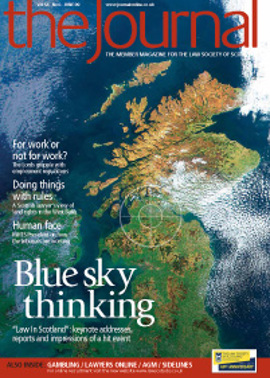New game, new rules

Commission ahead of the game
The Gambling Commission has striven to keep at the forefront of techological advances in the gambling industry and, for my money, has done well. It has now just released (May 2009) a third version of its Guidance to Local Authorities, which is testament to its aim of adapting to new gambling trends. The Commission’s website has a multitude of downloadable information forms, and you can register for a regular email update which really is of use if you practise in this area. The new guidance document is available at: http://tinyurl.com/o2ktlw.
The Guidance, which runs to about 170 pages, should be mandatory reading for all licensing clerks and their staff. It tackles each element of the new gambling laws in turn, from the status of the Commission itself and how licensing boards in Scotland should apply the three “gambling” objectives, to specific guidance on how applications for premises licences and alcohol premises entitlements should be dealt with.
The new Guidance also takes account of the Licensing (Scotland) Act 2005 and it is heartening to see that the Scottish context has been catered for throughout. Although primarily aimed at in-house staff, it is of course of tremendous value to private practitioners, and I would also suggest that the new licensing standards officers, who may yet be called upon to assist with compliance under the gambling regime, should give it a “spin”.
Split premises and primary activity
One of the more controversial concepts to arise under the new gambling laws is that of “split premises” and “primary activity”. This relates to what some might describe as a loophole, in which an operator could establish an artificial separation of his premises by having two licences cover two “separate” areas within the same building, and then reap the rewards of having double the number of gaming machines.
Several operators across Scotland have already achieved this, but the extent to which premises have been separated has led to controversy – some premises have been specially adapted and it is clear that some money has been spent, but others have provided less substantial forms of separation and in those circumstances are viewed by some as flouting the rules.
The Gambling Commission became increasingly concerned about this activity and in June 2008 took the step of releasing a special note (http://tinyurl.com/67bcbv) in which it expressed its views as to the legality of splitting premises in such a way. That consultation, and the responses it provoked, led to the matter being specifically catered for in the new Guidance. The Commission reminds the reader of the format of s 150 of the Gambling Act which, in its interpretation, authorises a specific type of activity to be carried on by virtue of a specific type of premises licence. (Its interpretation may not always be accurate – see the Southend case in the lower panel.)
The Guidance states (at 7.14):
“the crux of the matter is whether the proposed premises are genuinely separate premises that merit their own licence with, for example, the machine entitlements that brings and are not an artificially created part of what is readily identifiable as a single premises”. What the Commission is getting at here is that a bingo or betting premises licence should be used primarily for bingo or betting activities, and that gaming machines should be ancillary to the “primary activity”. In turn, premises should not be artificially split to double the number of machines.
If you act for a gaming operator seeking to increase revenue by splitting premises and introducing more machines, this new guidance is a must read.
Gaming machines in pubs
It has been put to me in the past that the automatic entitlement to two gaming machines for alcohol licensed premises can be refused by virtue of the disapplying power afforded to a licensing board under s 284 of the Gambling Act, perhaps on the basis that the board thinks the premises will not make the machines available in accordance with the gambling licensing objectives. In my view this approach is wrong.
The automatic entitlement under s 282 is just that: a guaranteed statutory right and it cannot be pre-emptively refused. A licensing board does not have the power to refuse a notification of the intent to take up the entitlement. For the disapplying power to take effect, the automatic entitlement must first exist, and then it can be used only where the licensing board has proof, having observed the operation of the entitlement, that the provision of the machines is not in accordance with the objectives (e.g. children are found to be playing machines); or that the operator is in breach of a condition; or that the premises are used solely for gaming. Happily, the new Guidance confirms this at para 26.3.
Poker play
I have come across a number of clubs and organisations now providing poker in pubs who are woefully unaware of the specific rules which need to be followed. Many think that, so long as the maximum stakes and prizes are observed, then poker is legal. That is not the whole story and poker operators are urged to seek specialist advice. There are a number of other rules which have to be followed, such as:
- The poker games must be supervised by the premises manager or s 11 nominee.
- This person must ensure there is no underage gambling.
- This person must promote a “pleasant atmosphere and deny participation to cheaters and colluders”.
- Cash games are not permitted (i.e. no money on the table).
- Poker chips must be provided by the premises, not the poker organiser.
- Gaming equipment must be locked up when not in use.
- Records must be kept showing the number of games, the number of players, and the amounts staked.
- Stephen McGowan, Tods Murray LLP, is the author of “Gaming in Pubs & Clubs” (2008) and “Licensing & Gambling Law in Scotland”, recently published by Avizandum.
Case law review: William Hill v Calvert (2009) 159 NLJ 36
Some readers may have come across the case of Graham Calvert, a self-confessed gambling addict and greyhound trainer who sued William Hill for allowing him to run up debts of some £2 million.
His argument was, in very simple terms, that William Hill had a duty of care to him as a vulnerable person to stop taking his bets. This argument was founded on the new concept of “self exclusion”, a duty placed on providers of gambling under the Gambling Act 2005, which requires them to have procedures in place to prevent problem gamblers from continuing to gamble. William Hill did not try to argue that there was no such duty; indeed, there was an exclusion policy in place for Mr Calvert which was not observed.
At the first instance the court held that that there was no higher “duty of care” available to problem gamblers, and although William Hill had continued to accept his telephone bets after an exclusion policy had been set up, Mr Calvert’s addiction was such that he would have continued to gamble regardless of any exlusion policy and therefore there was no causation. Mr Calvert appealed, but the appellate court agreed that a pathological gambler would have simply lost the money elsewhere and upheld the notion that there was no general “duty of care” to problem gamblers.
The effectiveness of the “self exclusion” policy would therefore seem to be limited if the aim is to prevent problem gambling. If it is not observed, then what is the remedy?
Case law review: Betting Shop Services Ltd v Southend-on-Sea BC [2008] EWHC 105 (Admin)
This case relates to what are known as “provisional statements” under the Gambling Act 2005. The Act makes provision under s 204 for an application where the premises are to be constructed, altered, or the applicant expects to acquire a right to occupy.
The applicant applied for a full premises licence for premises which were in the process of being constructed. The building had a certain amount of outer structure but was nowhere near “kitted out” for the purpose of providing gambling actitivies. The council declined to consider the application and returned it as incompetent, basing its decision on guidance from the Gambling Commission to that effect. However, the applicant had met with all the statutory requirements for a premises licence under s 159, and the court held that the council was obliged to consider and determine the application.
The court also expressed the clear view that the guidance was not part of the statutory application procedure, and that the Commission’s interpretation of the statute was merely “of interest”. The court was the proper authority to interpret the Act. The result of the judgment is that it is perfectly competent for a full premises licence application to be granted for a premises which is not yet constructed. What then of provisional statements? These would seem now to be the sole preserve of speculative applicants who do not have the right to occupy the premises at the time of application.
In this issue
- Spanish executry law – cross border issues
- The Scottish Parliament’s Emergency Bill procedure
- One year on
- Unequal before the law (1)
- Ian Smart's inauguration speech
- Your new First XI
- Dangerous loophole
- Unlocking the rule of law
- Our guiding light
- A hit for the conference
- Of chairs, trains and escalators
- Unequal before the law
- Matters of the mind
- New game, new rules
- Advance on all fronts
- Making openness work
- The First XI
- Society parleys with the OFT
- Professional Practice Committee
- Committees: the unsung heroes
- Find a client?
- Platform for success?
- Ask Ash
- Constant foe
- Killer question
- A time to be inventive
- Deep pockets required?
- Win some, lose some
- New client - new problems
- Website review
- Book reviews
- A business view






